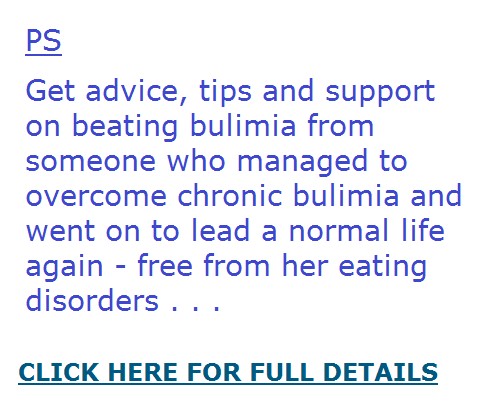How to Overcome Bulimia is a frequent Internet search.
If you are suffering from bulimia, or you are family or a friend of someone suffering from bulimia, then you will be keen to find a lasting cure and a reliable answer to your understandably urgent question – how do you overcome bulimia ?
On this page, I will briefly describe some of the damage to your body that can be caused by bulimia and show you where you can find the solutions for bulimia that you are searching for.
The stark reality is that eating disorders cannot be cured by swallowing a pill.
Neither can they be overcome without the will and full cooperation of the person with the eating disorder.
Read below to get the full story, or click on this link to get full details about a bulimia recovery program (devised by an ex-sufferer) that has proved to be highly effective for many bulimia sufferers > > > How to Overcome Bulimia
Understanding How to Overcome Bulimia
The truth is that neither bulimia nor anorexia have anything to do with food. They are both symptoms of an underlying issue that may be connected with self image or a feeling that life is out of control. Bulimia and anorexia are both tools the sufferer uses in order to try and regain some personal mastery over these issues.
While this is obviously going to make matters far worse, and possibly become a recipe for an early death, the bulimic or anorexic person often cannot see the self-harm that is being caused and neither can he/she step off this emotional rollercoaster without some reliable and continuous help and support.
Another challenge a bulimic person may encounter when trying to get help, is that the medical profession mostly insists that the bulimia sufferer needs to take responsibility for her (mostly “her” – but increasingly “his”) situation. Medical intervention is so often all about medical procedures and interventions while frequently failing to understand patients problems from a holistic point of view.
Both bulimia and anorexia should be treated in the same way as alcoholism. While this may sound like an odd thing to say, there are some very good reasons:
- Although less obvious than alcoholism – Bulimia and Anorexia are mostly shrouded in secrecy. Sufferers work hard to conceal their symptoms.
- Sufferers are in denial that they have a problem.
- There is almost always an underlying psychological problem.
Click on these links for more information:
What is Bulimia ?
What is Anorexia ?
How to Overcome Bulimia
Bulimia Symptoms – Side-Effects and Damage
Although bulimia is likely to affect many bodily functions as well as life expectancy, here is just one example of the destructive force of bulimia.
This list of damage shows you how bulimia can affect the mouth and teeth of a bulimia sufferer
– Tooth enamel can become very thin.
– Teeth can fall out.
-Increased risk of developing gum disease is very likely.
– Saliva glands can swell due to the effects of vomiting
– The jaw and cheeks can swell for the same reason.
– Sore throat due to induced vomiting.
– Acid Reflux due to induced vomiting.
To read a more in depth list of potential damage caused by bulimia – many of which can potentially be life-threatening – click on this link > > > Damage and Side-Effects
What You Need to Overcome Bulimia
If bulimia is to be successfully beaten, it is important that at least three things are accepted by the bulimia sufferer:
- Accept that you have a problem with Bulimia.
- Accept that you are seriously damaging yourself.
- Be prepared to take some sustained action to beat Bulimia.
This may sound obvious – but no bulimia treatment will be successful unless the person with the condition accepts those three basic points.
How to Support Someone to Overcome Bulimia
If you are a parent (or brother, sister, uncle, aunt or friend) – discovering someone you care about has bulimia and/or anorexia usually comes as a huge shock.
First instincts, which will be to help, are usually charged with emotion. But this is not a time for shouting, frustration and accusations.
People with eating disorders have complex psychological delusions going on and need very careful handling.
But – if you get their trust – you can really make a difference and help them out of their confused state of mind.
What you’re about to undertake is something you are probably totally unprepared for. What is needed from you is a firm commitment to support this person in the long term.
It can be quite a frustrating process for the person giving support, due to the very nature of bulimia. Because bulimia is a secretive and a very compelling illness, there will be almost certainly periods of time when the bulimia sufferer will slide backwards. And you may not even be aware of it.
The bulimia sufferer becomes extremely good at covering her tracks to make sure that nobody is aware of what is happening. However, if you have a close relationship with this person, there is no reason why you shouldn’t be able to monitor what’s happening as well as being the “go to person” for encouragement.
Whether you are the sufferer, or the helper, you will benefit greatly from visiting Shaye’s website.
Shaye is a young woman who was on a journey to a premature death from bulimia. She managed to pull herself back from the brink by using a bulimia recovery program that you can learn more about by following this link to her website > > > Bulimia Recovery Program
We hope this article goes some way towards answering your question – How to Overcome Bulimia – and that the advice, help and support Shaye offers will be successful for you.
Kind regards
The Natural Health Concerns Team
